FOREIGN EXCHANGE
The dollar strengthened despite slower job growth in the US in September, but prospects of a worsening economic slump in the months ahead could expose the greenback to a sudden decline, analysts say. The impact of the collapsing housing market on aggregate demand has the potential to pull the economy to the brink of an outright recession by early next year, says David Rosenberg, US economist at Merrill Lynch.
For the full year 2007, Merrill Lynch estimates the US economy will grow 1.8%, well below the International Monetary Funds forecast of 2.9%. Slowing housing construction will probably take about a percentage point off of growth in the second half of this year, and probably something going into next year as well, Federal Reserve chairman Ben Bernanke said in a speech in early October.
While worries about inflation could keep the Fed from cutting interest rates in the months ahead, markets likely will continue reducing their preoccupation with US inflation risks and shift their concerns toward a continued economic slowdown, says Stuart Scrase, an analyst at CMC Markets, a leading foreign exchange broker, which created one of the first online currency trading systems in 1996.
The sharp dollar rally in the face of news that only 51,000 new jobs were added to the US economy in September was largely due to big upward revisions to August and July payrolls, as well as a decline in the unemployment rate to 4.6% in September from 4.7%.
The Institute for Supply Managements US manufacturing survey for September delivered the worst of all worlds for the dollar, namely a falling headline index, falling prices and a contraction in the employment index, Scrase says. With the headline ISM falling to a 16-month low, the prices-paid index at a 14-month low, and the employment index falling back into contraction territory, the report suggests that further cooling in growth and diminishing pricing power will remove the Feds tightening bias, according to Scrase. Although manufacturing accounts for a declining share of the US economy, at less than 20%, its trend relationship with growth of gross domestic product remains intact, he says.
Meanwhile, contrasting monetary policy conditions between the US and Europe indicated increased pressure for the dollar, Scrase says. The European Central Bank raised its benchmark interest rate by 25 basis points to 3.25% on October 5, in line with market expectations. The accompanying press conference statement said, After todays increase, the key ECB interest rates remain at low levels, money and credit growth are strong, and liquidity in the euro area is ample by all plausible measures.
The unanimous vote of the ECB governing council and comments by ECB president Jean-Claude Trichet reinforced expectations that the central bank will continue hiking interest rates, says Michael Woolfolk, senior currency strategist at The Bank of New York. While Trichets statement may not have been everything that euro bulls could have hoped for, since it dropped the code word vigilance on inflation monitoring, it did reinforce the ECBs commitment to continued removal of monetary accommodation and said risks to the outlook for prices remain clearly on the upside.
Despite concerns that housing-market weakness is sapping the strength of the US consumer, who accounts for nearly 70% of US economic activity, Marc Chandler, global head of currency strategy at Brown Brothers Harriman in New York, says the economy is resilient and stubborn price pressures mean that investors cannot be confident that the monetary tightening cycle is complete. While many observers have embraced the decline in oil prices and commodity prices in general as a force that will contain price pressures, we would emphasize the positive impact on growth from the fall in oil and gasoline prices and the decline in interest rates, Chandler says.
US mortgage rates have been declining, along with US bond yields, but high-frequency data are volatile, and We are not saying that the US housing market has bottomed, Chandler says. Our claim is more modest: Falling interest rates and falling oil and gasoline prices will help support consumption and the US economy in general, he explains. To this, we would add the strength of personal income in the US, which has risen 9.4% in the 12 months through August, he says. US personal income rose 0.3% in August to the highest level since January 1985.
Both income and spending remain solid so far this year, says Woolfolk of The Bank of New York. Full-employment conditions and the largest year-on-year rise in personal income in over 21 years have made the US consumer highly resilient to shocks that would have ordinarily derailed spending, he says. The recent decline in energy prices, if it persists, could be the countervailing force in 2007 that keeps the US economy growing at its trend pace and the Fed complacent with the current federal funds rate target, he adds.
If the dollar does get into trouble, either as a result of a sharp slowdown in the US economy or because of renewed worries about financing the record current-account deficit, analysts are confident that treasury secretary Henry Paulson will come to its defense.
It is refreshing to have a strong believer in the value of a strong US dollar in the treasury secretarys chair, says Carl B. Weinberg, chief economist at High Frequency Economics, based in Valhalla, New York. This guy has the moxie to suggest to the likes of Mr. Trichet and various euroland finance ministers that their deflationary monetary and fiscal policies may exacerbate the imbalances by discouraging consumption and demand, he says. We think this is leading to a new era of pro-active, pro-dollar international economic diplomacy, he says.
We are optimistic that Secretary Paulson has already taken Sino-US economic relations to a new place where neither former secretary John Snow nor President Bush has been able to go, Weinberg says. Paulson brings to the table certain pragmatic ideas that Snow was never willing, or able, to formulate, he says.
Following Paulsons visit to China in late September, Senators Charles Schumer, a New York Democrat, and Lindsey Graham, a South Carolina Republican, dropped their bid for punitive US tariffs on China to force it to revalue its currency.
CURRENCY FORECASTS
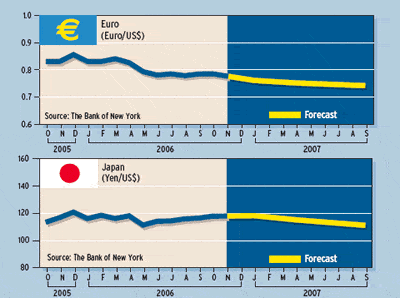
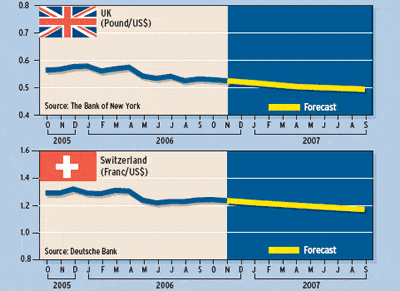
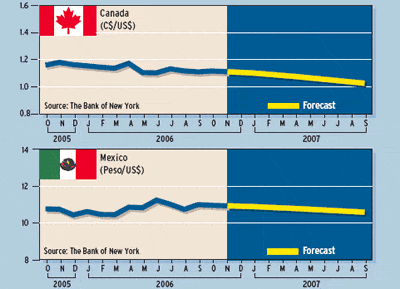
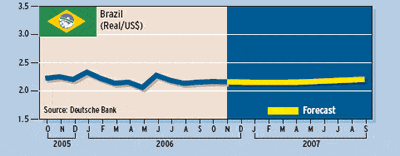
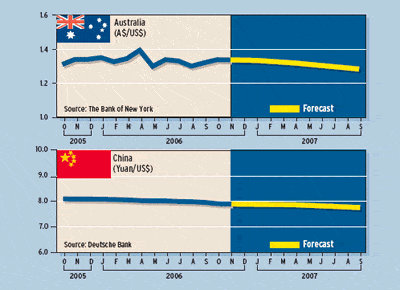
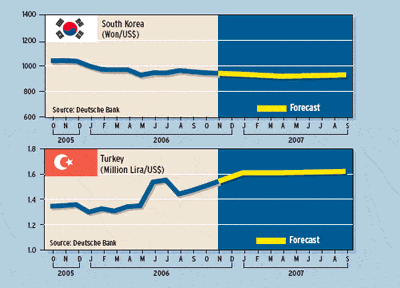
Gordon Platt



